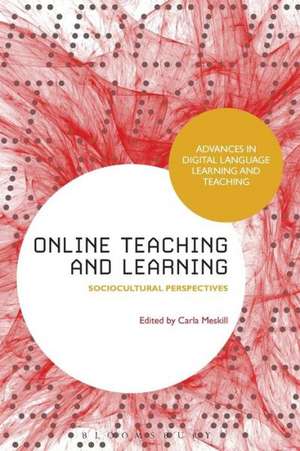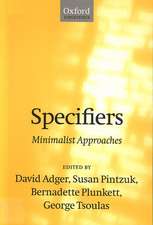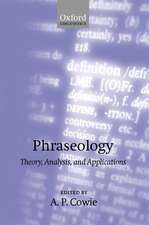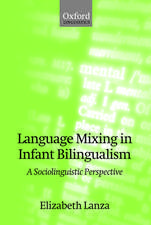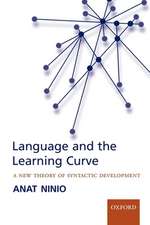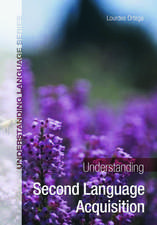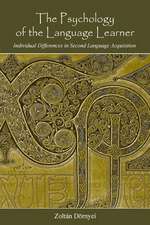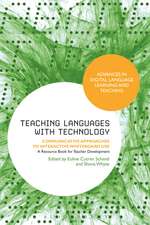Online Teaching and Learning: Sociocultural Perspectives: Advances in Digital Language Learning and Teaching
Editat de Professor Carla Meskillen Limba Engleză Paperback – 25 feb 2015
| Toate formatele și edițiile | Preț | Express |
|---|---|---|
| Paperback (1) | 257.50 lei 6-8 săpt. | |
| Bloomsbury Publishing – 25 feb 2015 | 257.50 lei 6-8 săpt. | |
| Hardback (1) | 949.17 lei 6-8 săpt. | |
| Bloomsbury Publishing – 14 aug 2013 | 949.17 lei 6-8 săpt. |
Din seria Advances in Digital Language Learning and Teaching
- 23%
 Preț: 190.50 lei
Preț: 190.50 lei - 23%
 Preț: 192.36 lei
Preț: 192.36 lei - 23%
 Preț: 192.90 lei
Preț: 192.90 lei - 13%
 Preț: 257.59 lei
Preț: 257.59 lei - 13%
 Preț: 239.14 lei
Preț: 239.14 lei - 22%
 Preț: 239.02 lei
Preț: 239.02 lei - 23%
 Preț: 229.68 lei
Preț: 229.68 lei - 22%
 Preț: 230.69 lei
Preț: 230.69 lei - 22%
 Preț: 260.07 lei
Preț: 260.07 lei - 22%
 Preț: 230.15 lei
Preț: 230.15 lei - 23%
 Preț: 199.37 lei
Preț: 199.37 lei - 23%
 Preț: 192.36 lei
Preț: 192.36 lei - 30%
 Preț: 570.43 lei
Preț: 570.43 lei - 30%
 Preț: 569.94 lei
Preț: 569.94 lei - 30%
 Preț: 568.22 lei
Preț: 568.22 lei
Preț: 257.50 lei
Preț vechi: 295.40 lei
-13% Nou
Puncte Express: 386
Preț estimativ în valută:
49.27€ • 51.34$ • 40.80£
49.27€ • 51.34$ • 40.80£
Carte tipărită la comandă
Livrare economică 03-17 aprilie
Preluare comenzi: 021 569.72.76
Specificații
ISBN-13: 9781474222884
ISBN-10: 1474222889
Pagini: 256
Dimensiuni: 156 x 234 x 15 mm
Greutate: 0.36 kg
Editura: Bloomsbury Publishing
Colecția Bloomsbury Academic
Seria Advances in Digital Language Learning and Teaching
Locul publicării:London, United Kingdom
ISBN-10: 1474222889
Pagini: 256
Dimensiuni: 156 x 234 x 15 mm
Greutate: 0.36 kg
Editura: Bloomsbury Publishing
Colecția Bloomsbury Academic
Seria Advances in Digital Language Learning and Teaching
Locul publicării:London, United Kingdom
Caracteristici
Theoretical framing and research methodologies that account for complexities of language and culture.
Notă biografică
Carla Meskill is Professor, Department of Education Theory and Practice at the University of Albany, State University of New York, USA.
Cuprins
Introduction: Sociocultural Research Perspectives for Online Teaching and Learning, Carla MeskillPart 1: Diversity/Identity Online1. Balancing Multiple Discourses in the U.S. Distance Learning Context:A Case of a Chinese Student, Gulnara Sadykova2. Projection of Teacher Identity in Introductory Posts: a Critical Discourse Analysis of Strategies of Online Self-Presentation, Denis SamburskiyPart 2: Shifts in Practice3. An Exploration of Three-Dimensional Virtual Worlds through ESL/EFL Teachers' Perspectives in Second Life, Ozan Varli4. Collaboration Unpacked: Tasks, Tools, and Activities, Andreas Lund5. Synchronous Online Language Teaching: Strategies to Support Learner Development, Iryna Kozlova and Evon ZundelPart 3: Shifts in Participation6. The Educational Value of Student Talk in Online Discussions, Sedef Uzuner and Ruchi Mehta7. Focusing on the social: Research into the distributed knowledge of novice teachers in online exchange, Melinda Dooly8. Perceptions of Humor in Oral Synchronous Online Environments, Natasha Anthony9. Face-to-face and Online ELL Writing Tutorials: A Comparison, Jason VickersPart 4: Informal Online Learning10. Rapport Management and Online Learning: L2 Socialization in Livemocha, Adrienne Gonzalez11. "We don't have to always post stuff to help us learn": Informal Learning Through Social Networking in a Beginners' Chinese group, Marie-Noelle LamyIndex
Recenzii
This edited volume is a welcome contribution to the body of scholarship on online learning -- and in particular to language learning, which is heavily represented across the chapters. Meskill has brought together a collection of studies that highlight the role that agency, environment and social practices play in the learning process. Covering technologies ranging from Second Life to wikis, and discursive elements ranging from introductions to humor, these studies are engaging and highlight the diverse ways in which discussion-based learning may occur.
What is so appealing about this new volume edited by Carla Meskill is its willingness to engage with the complexities of learning and teaching online. Thus, broad generalizations about effectiveness and value are replaced by rigorous research studies that chart the participant experience over time and in detail, within a sociocultural view of learning. The result is a collection full of wisdom and insight reflecting the knowledge and experience of the contributors. The four parts of the book facilitate a breadth and depth of treatment that is especially effective in providing more complete descriptions of the learner experience and practical suggestions for the reflective online teacher.
What is so appealing about this new volume edited by Carla Meskill is its willingness to engage with the complexities of learning and teaching online. Thus, broad generalizations about effectiveness and value are replaced by rigorous research studies that chart the participant experience over time and in detail, within a sociocultural view of learning. The result is a collection full of wisdom and insight reflecting the knowledge and experience of the contributors. The four parts of the book facilitate a breadth and depth of treatment that is especially effective in providing more complete descriptions of the learner experience and practical suggestions for the reflective online teacher.
